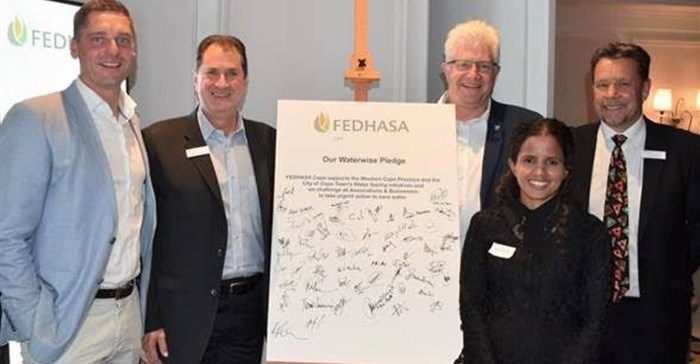
Top stories



Marketing & MediaWarner Bros. was “nice to have” but not at any price, says Netflix
Karabo Ledwaba 1 day



More news

Logistics & Transport
Maersk reroutes sailings around Africa amid Red Sea constraints
















Members participated in a Q&A discussion and directed questions to a panel made-up of Jeff Rosenberg; Western Cape minister for economic opportunities, Alan Winde; mayoral committee member for informal settlements, water and waste services and energy, councillor Xanthea Limberg and Lea Smith, Institute of Plumbing South Africa; thereafter signing the FEDHASA Cape Water Wise Pledge to demonstrate the commitment to reduce water consumption and increase awareness campaigns for guests. The pledge was later handed over to Winde.

The FEDHASA Cape Water Wise Pledge states: “FEDHASA Cape supports the Western Cape Province and the City of Cape Town's Water Saving initiatives, and we challenge all associations and businesses to take urgent action to save water. We are committed to both short and long-term improvement in our water conservation measures, as a part of our commitment to responsible tourism practices that protect and enhance the natural, cultural, social and economic environment.”
Day zero is not an option and we are challenging the commercial sector to work alongside us to avoid it. Water saving is a unified effort and hoteliers can’t do it alone. The responsibility to conserve this much-needed resource rests on all of our shoulders.
Each individual member establishment that signed the pledge will also sign and display a copy of the full pledge in their respective properties for all to see and be reminded that Cape Town hotels are doing what’s necessary to conserve water. In addition, FEDHASA Cape will also establish a water-wise task team to assist members to, among other things, develop a water wise policy and implementation plan for their businesses, as well as assist with the capturing and monitoring process.
“Day zero is not an option and we are challenging the commercial sector to work alongside us to avoid it. Water saving is a unified effort and hoteliers can’t do it alone. The responsibility to conserve this much-needed resource rests on all of our shoulders. We were united with the power crisis and we need to do the same now. Everyone agrees that we’re nothing without water,” said Rosenberg.
To strengthen member establishments’ awareness campaigns, Rosenberg said hotels are advised to ‘start in the lobby’. He suggested ‘in your face tactics’ to communicate to guests, including international visitors, the extent of the crisis and urged hotels to continue implementing existing initiatives and enforcing new ones.
“We need to be robust in our efforts and need to start thinking innovatively to come-up with new, fresh ideas to prevent this crisis from extending any further,” concluded Rosenberg.